Testing The Temperature 13
What do voters in Northern Ireland think about the Windsor Framework and UK-EU Relations?
May 2025
David Phinnemore[1] and Katy Hayward[2]
This report is available to download here:
Executive Summary
- The impact that the Safeguarding the Union deal had in tempering negative views of the Windsor Framework has been reversed.
- 50% of respondents regard the Windsor Framework as ‘on balance a good thing for Northern Ireland’. This remains unchanged since October 2024 but lower than in most previous polls.
- 51% see the Windsor Framework as an appropriate means for managing the effects of Brexit on Northern Ireland. This is significantly below the 60% February 2024 and at pre-Windsor Framework levels.
- Support for the Windsor Framework has dropped among both ‘slightly unionist’ and ‘strongly unionist’ respondents.
- 37% of respondents disagree that the Windsor Framework is ‘on balance a good thing’ for Northern Ireland - this the highest level since February 2023 when the Windsor Framework changes were agreed.
- Views on the political impact of the Windsor Framework remain less negative than they have been previously; most positive views are on its economic consequences.
- Voters continue to view the impact of the Windsor Framework on political stability in Northern Ireland as being more negative (39%) than positive (35%). This is significantly narrower than in October 2023 (55% negative, 26% positive).
- 47% of respondents think the Windsor Framework is having a positive impact on the Northern Ireland economy (down from 54% in June 2024); 37% disagree (up from 28% in June 2024).
- 58% think the Windsor Framework offers unique economic opportunities that could benefit Northern Ireland (down from 68% in June 2024).
- More voters continue see the impact of the Windsor Framework on Northern Ireland’s place in the UK internal market as negative (45%) rather than positive (32%) – a clear reversal of the situation in February 2024 (41% positive, 34% negative).
- Respondents remain more positive (41%) than negative (32%) about the impact the Windsor Framework is currently having on UK-EU relations
- More voters see the impact of the Windsor Framework on Northern Ireland’s constitutional place in the UK as negative (45%) than positive (20%). The gap is considerably wider than in October 2023 (43% negative, 29% positive).
- Voters view the impact of the Windsor Framework on British-Irish relations as more positive (40%) than negative (32%); a reversal of the situation a year ago, in June 2024, when more viewed the current impact as negative (41%) than positive (31%).
- There continue to be mixed levels of trust/distrust in political actors and institutions to manage Northern Ireland’s interests with respect to the Windsor Framework.
- The figures on trust/distrust in the UK Government are the warmest seen since our polling began. Nevertheless, it remains by far the most distrusted (68%) and least trusted (11%) of all actors.
- Voters are almost evenly split on whether they currently trust (44%) or distrust (42%) the European Commission/EU.
- Northern Ireland business representatives continue to be the actors most trusted (54%) to manage Northern Ireland’s interests with respect to the Windsor Framework; only 16% of respondents distrust them.
- On the management and monitoring of the Windsor Framework:
- Most respondents are aware of joint EU-UK bodies overseeing the implementation of the Windsor Framework even if less than a third follow their activities; only a minority of respondents regard any of these bodies as effective.
- Most respondents are aware of the Northern Ireland Affairs Committee in the House of Commons and the Northern Ireland Scrutiny Committee in the House of Lords
- One in ten respondents follow the activities of NI Assembly’s Windsor Framework Democratic Scrutiny Committee; a third (32%) have not heard of it
- Half of respondents (56%) are aware of the Independent Review on the Windsor Framework but more than two in five (43%) have not heard of it.
- The majority of respondents see the ability of bodies to identify issues that matter to Northern Ireland (53%) as most or very important for determining their effectiveness
- Most respondents see the bodies’ engagement with NI stakeholders as more important for their effectiveness than the participation in them of NI political representatives or NI civil servants
- On the implementation of the Windsor Framework
- Almost two fifths (38%) of respondents agree that unionist MLAs were right to vote in December 2024 against democratic consent for the continued application of Articles 5-10 of the Windsor Framework. Almost half of respondents (47%)
- Most respondents (49%) disagree with the attempt of unionist MLAs in December 2024 to have the Stormont Brake pulled. The majority of DUP (94%) and UUP (68%) voters agree.
- The majority of respondents (52%) agree that the UK Government was right to reject that call for the Stormont Brake to be pulled; a quarter (26%) disagree. Unsurprisingly, there are significant differences between party supporters on this question too, with 91% and 87% of Sinn Féin and SDLP supporters respectively agreeing with the Government’s decision (compared to 4% of DUP supporters and 35% of UUP supporters).
- More than a third of respondents (38%) agree that MLAs should oppose the addition of any new EU acts to the Windsor Framework ‘regardless of the political or practical consequences’; most, however, disagree (48%).
- Fewer female (32%) than male (45%) respondents support unionist MLAs' vote against democratic consent and attempt to pull the Stormont Brake. This was the largest gap between males and females in the poll. There was also more support from females (55%) than males (49%) for the UK Government's decision not to pull the Stormont Brake. And a smaller proportion of females (34%) than males (42%) wish to see MLAs oppose new EU acts regardless of the consequences.
- A majority (52%) of respondents have ‘direct experience of GB suppliers identifying the Windsor Framework as the reason for not sending goods’ to Northern Ireland; however, political affiliation is a significant factor in such ‘experiences’, with 85% of ‘strongly unionist’ respondents saying they have had such experience compared to 18% of ‘strongly nationalist’ respondents.
- A majority (60%) of respondents believe that the Windsor Framework is being ‘undersold in terms of the dual market access opportunities’ it provides for NI producers.
- Only a quarter (23%) of respondents expect that the Independent Review of the Windsor Framework will lead to changes in the operation of the Windsor Framework.
- On the future of the UK-EU relationship:
- Two thirds of respondents (66%) support the UK Government’s policy of pursuing closer relations with the EU.
- Support is particularly high among respondents identifying as ‘nationalist’ (96%), ‘neutral’ (88%) and ‘slightly unionist’ (66%); in contrast, 74% of ‘strongly unionist’ respondents oppose the pursuit of closer UK-EU relations.
- Almost half (46%) of respondents agree that the ‘full and faithful’ implementation of the Windsor Framework is a fair requirement for a reset in UK-EU relations; a third (34%) disagree.
- For a majority of respondents who support closer UK-EU relations, the top priority for this ‘reset’ is increasing trade between the UK and the EU and reducing formalities, checks and controls on the movement of goods between GB and Northern Ireland. The next two priorities for the UK-EU ‘reset’ are a UK-EU youth mobility scheme and an SPS agreement.
Introduction
Since 2021 we have commissioned a series of regular polls to ‘temperature test’ the views of voters in Northern Ireland (NI) on a range of issues relating to Brexit and the Windsor Framework (originally the ‘Protocol on Ireland/Northern Ireland’) and their implications. This is the only polling in Northern Ireland dedicated to the topic of the Windsor Framework. Polls are currently being run every six months
The polls are conducted by LucidTalk using its online Northern Ireland Opinion Panel. LucidTalk have a strong track-record of accurately predicting election and referendum results in Northern Ireland on the basis of polling this Opinion Panel. The results presented here are from a sample of 1020 responses (from a total of 2055 received) to the poll undertaken on 25-28 April 2025.[3] The sample used is weighted to be representative of the adult population of Northern Ireland (e.g. by age, gender, region). All results presented are accurate to a margin of error of +/-2.3% at 95% confidence.
The context for this poll
This thirteenth full poll was conducted more than four years after the original Protocol on Ireland/Northern Ireland entered into force on 1 January 2021, two years after the UK and the EU in February 2023 agreed the Windsor Framework on revised arrangements for the implementation of the Protocol, and a year after the UK Government of Rishi Sunak agreed the Safeguarding the Union ‘deal’ with the Democratic Unionist Party (DUP) that led to the return of the NI Assembly and a new NI Executive being established in February 2024.
Early polls in 2021-22 were conducted in a context of ongoing contestation and political tensions around the Protocol and often strained UK-EU relations. Since adoption of the Windsor Framework the context has been one of significantly improved UK-EU relations with joint EU-UK bodies overseeing implementation of the Windsor Framework meeting regularly, new bodies being established, and joint commitments to stakeholder engagement being put in place. The return of the NI Assembly has also meant the Windsor Framework Democratic Scrutiny Committee has been established, the Stormont Brake on amendments and replacements to EU law applicable under the Windsor Framework is available for use, and ‘applicability motions’ adopted with a cross-community majority are now generally required for the UK to agree to new EU legislation being added to the Windsor Framework.
Implementation is ongoing with some issues still to be addressed, however (e.g. on the supply of veterinary medicines into Northern Ireland once the current ‘grace period’ expires at the end of 2025). Concerns around the Windsor Framework, particularly among unionist voters, persist. This is despite the Safeguarding the Union deal’s new commitments regarding Northern Ireland’s position within the UK and actions to deliver on them. These included: new domestic bodies and structures (e.g. a UK East-West Council); UK Government departments giving ‘special regard to Northern Ireland’s place in the UK internal market’ when bringing forward regulation; a UK Government commitment to 'no unnecessary checks within the UK internal market’; and a UK Internal Market Guarantee aiming to ensure that at least 80% of freight movements from Great Britain (GB) to Northern Ireland go through the ‘UK Internal Market System’ (previously the ‘green lane’). Legislation has been adopted implementing most of the commitments.
Since the return of the NI Assembly and the establishment of the current NI Executive, MLAs have adopted one ‘applicability motion’ and rejected another on geographical indicators (GIs) for non-agri-food products, and held their first ‘democratic consent’ vote on the continued application of much of the Windsor Framework which passed in December 2024 but without a cross-community majority. Consequently, the UK Government commissioned Lord Murphy of Torfaen to conduct an Independent Review of the Windsor Framework which is due to report in July 2025.
An attempt by unionist MLAs to activate the Stormont Brake on legislation concerning the packaging and labelling of chemicals was made in December 2024 but rejected by the UK Government. It also announced on 24 April 2025 – the day before the poll was launched – that it would be agreeing to the EU’s new act on GIs being added to the Windsor Framework despite MLAs not approving an applicability motion; it argued that no new regulatory barrier would be created and so it could proceed.
More generally, the poll took place against the background of the UK Government ‘reset’ in relations with the EU and preparations for a UK-EU summit on 19 May 2025. A prerequisite for closer relations has always been implementation of the Windsor Framework to which the Labour UK Government has repeatedly committed. This was reflected in the joint statement following a meeting of the EU-UK Specialised Committee on 6 March 2025 where the co-chairs noted ‘the importance of continued constructive joint work… to ensure the full, timely and faithful implementation of all the elements of the Framework’.
Shortly before the poll, 1 May 2025 was confirmed as the date when new arrangements for the GB-NI movement of parcels and freight would come into effect. Concerns existed that these would lead to disruption in the supply of goods from some GB companies to Northern Ireland. This would follow the disruption caused to some supplies by the introduction in Northern Ireland of the EU’s General Product Safety Regulation in December 2024. Also being discussed in advance of the poll was what impact US tariffs on trade with the UK and with the EU would have on Northern Ireland given the Windsor Framework, and the potential effects for supermarket shelves of the next phase of ‘not for EU’ labelling starting on 1 July 2025.
Participants in the poll on 25-28 April 2025 were asked six sets of questions and offered the opportunity to provide written comments in response to the poll. The questions covered attitudes towards Brexit and the Windsor Framework and assessments of the latter’s impact. As in previous polls, participants were asked to indicate how much they trust different actors to manage Northern Ireland’s interests regarding the Windsor Framework. They were also asked for their views on key bodies involved in managing the Windsor Framework and their views on the Windsor Framework’s implementation including the outcome of the NI Assembly’s 2024 ‘democratic consent’ vote. A final section sought views on the UK Government’s commitment to closer relations with the EU.
Attitudes to Brexit and the Windsor Framework
This latest polling continues to show most voters in Northern Ireland as either generally accepting or supportive of the Windsor Framework. However, opinion remains divided, with continued opposition among many unionists to its arrangements. The slight warming to the original Protocol under the Windsor Framework (as seen in the June 2023 poll) continues to be reflected in some of the findings of this latest poll, but on some questions levels of support have dropped compared to previous Testing the Temperature polls, and in some instances have returned to pre-Windsor Framework levels. Opposition to the Windsor Framework remains firm among around a third of respondents, who predominantly self-identify as ‘strongly unionist’.
Two thirds of respondents (65%) claim a ‘good understanding’ of the Windsor Framework (see Figure 1). This is the same as in October 2024, so down on previous polls (e.g. 74% in October 2023) and the lowest recorded level across our polls. Also lower is the proportion of respondents (45%) who think that reliable information exists on the Windsor Framework. In February 2024, more than half of respondents (54%) thought that reliable information exists, but by October 2024 the figure had fallen to 41%, albeit above the lowest level recorded (37%) in March 2021.
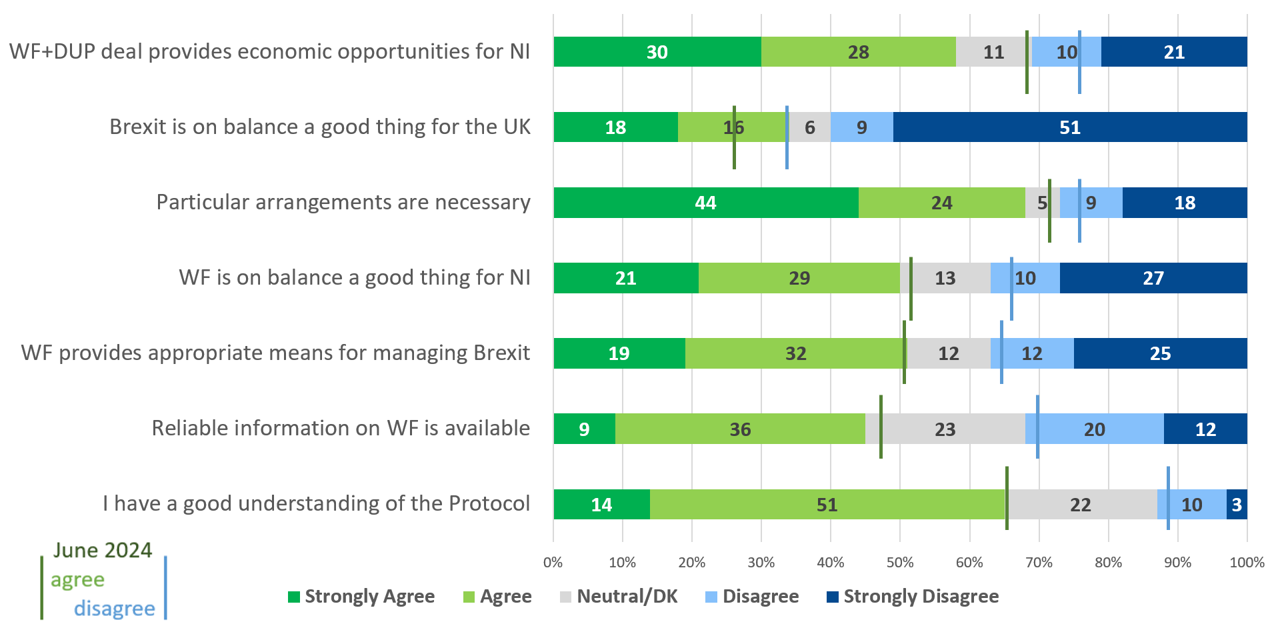
Figure 1. Opinion of Brexit and the Windsor Framework (%)
The clear majority of respondents (68%) continue to agree that ‘particular arrangements’ for Northern Ireland are needed to manage the effects of Brexit. The proportion of all respondents being strongly of this view (44%) has fallen back from 51% in June 2024, the highest recorded to date in our polls.
The narrow majority (51%) who agree or strongly agree that the Windsor Framework – now with the UK Government’s Safeguarding the Union deal with the DUP – provides an appropriate means for managing the effects of Brexit for Northern Ireland is again markedly below the 60% recorded in February 2024 and more in line with the 53-54% in polls prior to then when the question focused on the Protocol with the ‘grace periods’.
Half of respondents (50%) regard the Windsor Framework as ‘on balance, a good thing’ for Northern Ireland, although the figure remains down on the 55-56% figures seen in the June and October 2023 and February 2024 polls (see Figure 2). As in June 2024 (52%) it is at pre-Windsor Framework levels, although still above the lowest recorded level in June 2021 (43%).
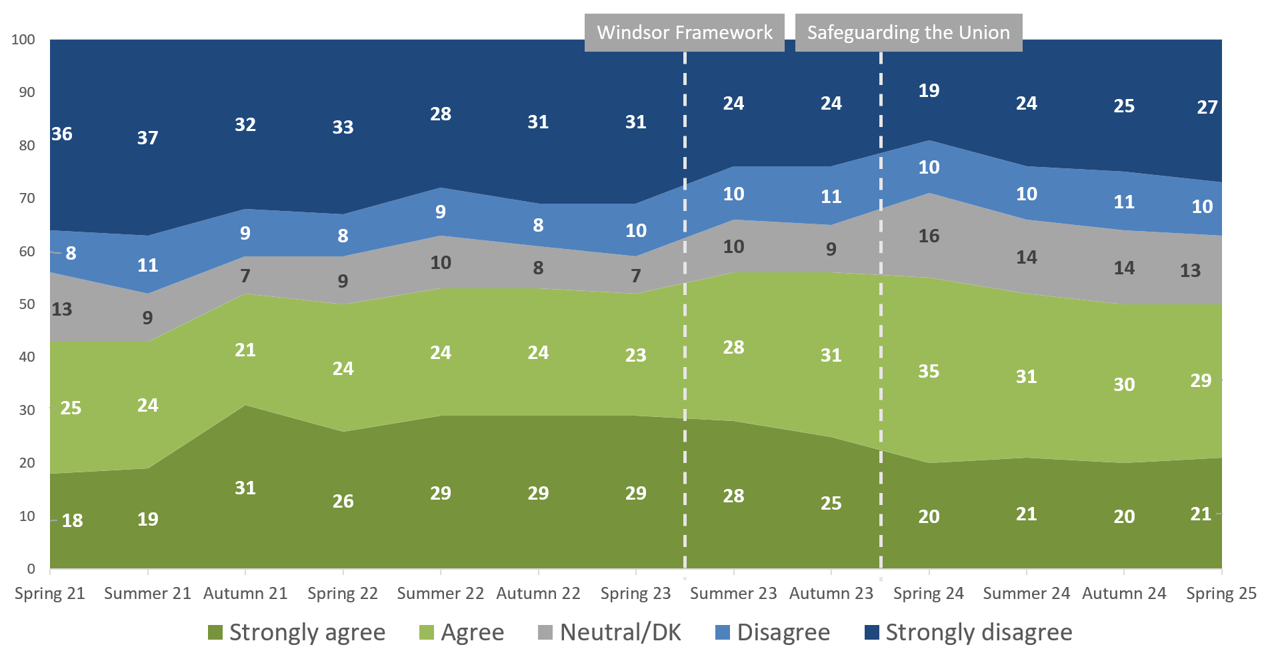
Figure 2. The Windsor Framework is on balance ‘a good thing’ for Northern Ireland (%)
As in most recent polls, more respondents overall ‘agree’ rather than ‘strongly agree’ that the Windsor Framework is ‘on balance, a good thing’ for Northern Ireland. For those disagreeing with the proposition, the overall figure has risen over recent polls to 37% (having dropped to 29% in February 2024). It remains lower than the immediate pre-Windsor Framework figure in February 2023 (41%). The impact of Safeguarding the Union in tempering some opposition to the Windsor Framework has clearly been reversed.
On whether Brexit itself is on balance ‘a good thing for the UK’, there continues to be a clear majority (60%) who disagree, although the figure has fallen since October 2024 (66%). The size of the majority is in line with polls conducted in 2023 (e.g. 60% in October). The majority (51%) strongly of that opinion is among the largest across our polls to date. The proportion of respondents viewing Brexit as on balance ‘a good thing for the UK’ (34%) has recovered from the drop to 26% in June 2024 and is the highest it has been since February 2023 (34%).
Majority acceptance of the Windsor Framework is also reflected in responses to the question on whether it provides Northern Ireland with a ‘unique set of post-Brexit economic opportunities compared to the rest of the UK which, if exploited, could benefit Northern Ireland’. A majority (58%) agree that there are economic opportunities to be had from the Windsor Framework, but the figure has fallen since October 2024 (63%) and is notably lower than February and June 2024 (68%). Almost a third of respondents (31%) disagree there are economic opportunities, so towards the upper end of the range of previous polls (23-34%).
Views on the impact of the Windsor Framework
The poll asked respondents for their assessment of the current impact of the Windsor Framework being implemented (see Figure 3). Important to note here is that the phased implementation of the Windsor Framework removes the ‘grace periods’ for the application of some of the original Protocol’s provisions and replaces them with new ‘green lane’/Internal Market System arrangements for reducing/removing formalities, checks and controls on the GB-NI movement of goods.
On the question of the impact of the Windsor Framework on the economy of Northern Ireland, under half of respondents (47%) currently view it as positive, so down on February 2024 (56%), and even lower than in February 2023 (50%) (i.e. before the Windsor Framework changes were agreed); 37% view the impact as negative (also close to the February 2023 level of 39%). Respondents are clearly divided along identity lines. The clear majority of ‘strongly unionist’ voters viewing the impact as negative (82%) is, as in in October 2024, markedly above the level in June 2024 (65%). The proportion of ‘slightly unionist’ voters viewing the impact as positive (33%) has dropped significantly since October 2024 (46%) and is markedly down on February 2024 (50%). The proportion of nationalist (7%) and ‘neutral’ (16%) voters viewing the impact as negative remains slightly higher than in June 2024 but is very low.
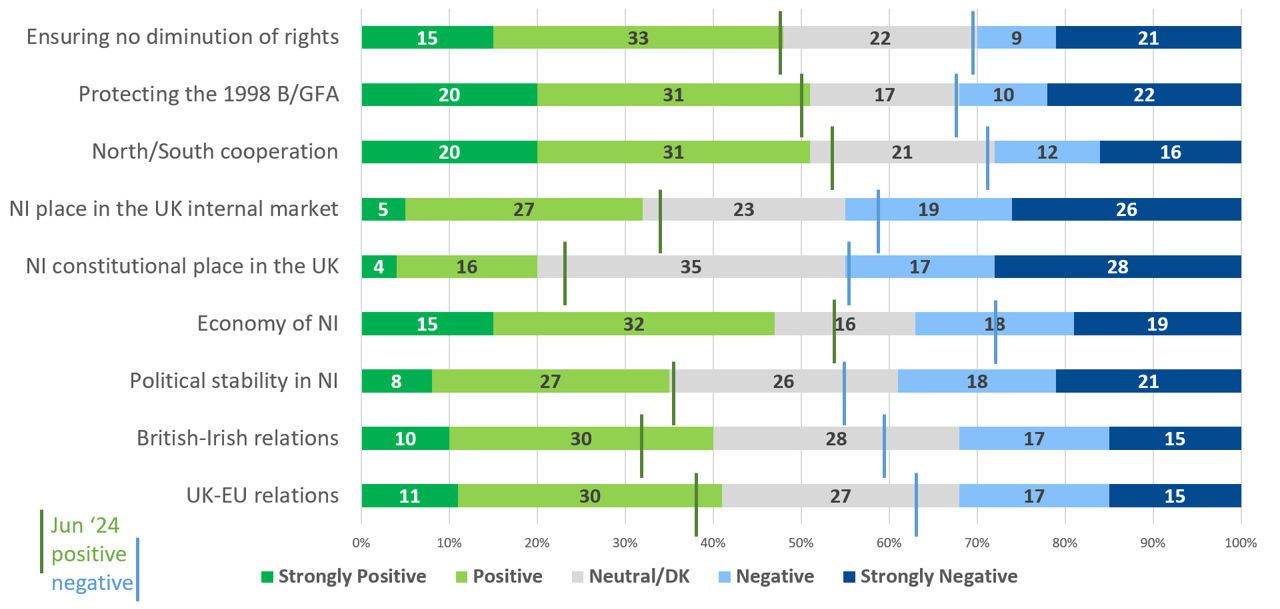
Figure 3. Overall assessment of the current impact of the Windsor Framework (%)
When it comes to Northern Ireland’s relationship with the rest of the UK, the impact of the Safeguarding the Union deal noted in February 2024 has clearly evaporated. Whereas in February 2024, for the first time, more voters regarded the impact of the Windsor Framework on Northern Ireland’s place in the UK internal market as positive (41%) than negative (34%), this is no longer the case: currently only 32% regard the impact as positive and 45% see it as negative. The overwhelming majority of ‘strongly unionist’ voters (90%) continue to view the impact as negative (up compared to 70% in February 2024 and 80% in June 2024).
The Safeguarding the Union deal saw ‘slightly unionist’ voters move from viewing the impact on Northern Ireland’s place in the UK Internal Market in October 2023 as negative (50%; positive 26%) to the plurality seeing it as positive (44%, to 38% negative) in February 2024. There has been a significant reversal in views over the last year. In October 2024, 49% of ‘slightly unionist’ voters saw its impact as negative and 35% saw its impact as positive; currently, 60% of ‘slightly unionist’ voters see its impact as negative and only 25% see its impact as positive. More than four fifths of nationalist voters continue to view the impact as either positive or neutral in this regard; the proportion of ‘neutral’ voters of this view has dropped to 72%.
Views on the impact of the Windsor Framework in political terms have typically been more negative. The proportion of respondents seeing the Windsor Framework’s current impact as negative on Northern Ireland’s constitutional position in the United Kingdom (45%) remains unchanged compared to June and October 2024 but higher than in February 2024 (37%).
In polls during 2021-23, a majority of respondents (54-68%) saw the Windsor Framework impacting negatively on political stability in Northern Ireland. The figure has since declined and is now at 39%, its lowest across all of our polls. 35% of respondents believe that the Windsor Framework is having a positive impact on political stability in Northern Ireland. This change in public opinion no doubt relates more to the fact of Northern Ireland having a functioning Assembly and Executive than to any effect of the Windsor Framework per se.
The latest polling confirms the more positive views on the Windsor Framework’s impact on British-Irish and UK-EU relations that have been present since the Windsor Framework was adopted. In February 2023, a majority of voters viewed the impact of the original Protocol as negative (British-Irish relations – 58%; UK-EU relations – 57%). With the Windsor Framework, the figures for negative impact on UK-EU and British-Irish relations went down. In this latest poll, 32% of respondents view the Windsor Framework as having negative impacts on UK-EU relations and on British-Irish relations. The proportion of voters perceiving the impact of the Windsor Framework on British-Irish relations to be positive (40%) has risen since October 2024, although is still lower than in June 2023 (43%). The proportion of voters viewing the impact of the Windsor Framework on UK-EU relations as positive (41%) remains lower than in October 2023 (46%).
Most respondents continue to view the Windsor Framework as having a positive impact on protecting the 1998 Agreement. Currently, 51% are of this view. The proportion of respondents who view the impact as negative (32%) remains above the lowest negative figure to date in February 2024 (30%).
On the impact of the Windsor Framework on ensuring ‘no diminution’ of individual rights as set out in the 1998 Belfast (Good Friday) Agreement, 48% of respondents regard it as positive. This is in line with the previous two polls. The proportion of respondents viewing the impact as negative (30%) is in line with polls in May and October 2024, and so up from 27% in February 2024 and towards the level of October 2023 (33%).
By February 2023, almost equal proportions of respondents viewed the impact of the original Protocol on north-south cooperation as negative and as positive. With the Windsor Framework, a significant shift occurred. By February 2024, 53% were positive and 25% negative; the latest poll confirms this gap (51% positive; 28% negative).
Trust to manage the interests of Northern Ireland vis-à-vis the Windsor Framework
Implementation of the Windsor Framework involves a range of actors. As with all of our previous polls, the only group that is trusted by a majority to manage the interests of Northern Ireland with respect to the Windsor Framework are NI business representatives (54%) (see Figure 4). More trusted (45%) than distrusted (30%) are also civic society groups (e.g. trade unions).
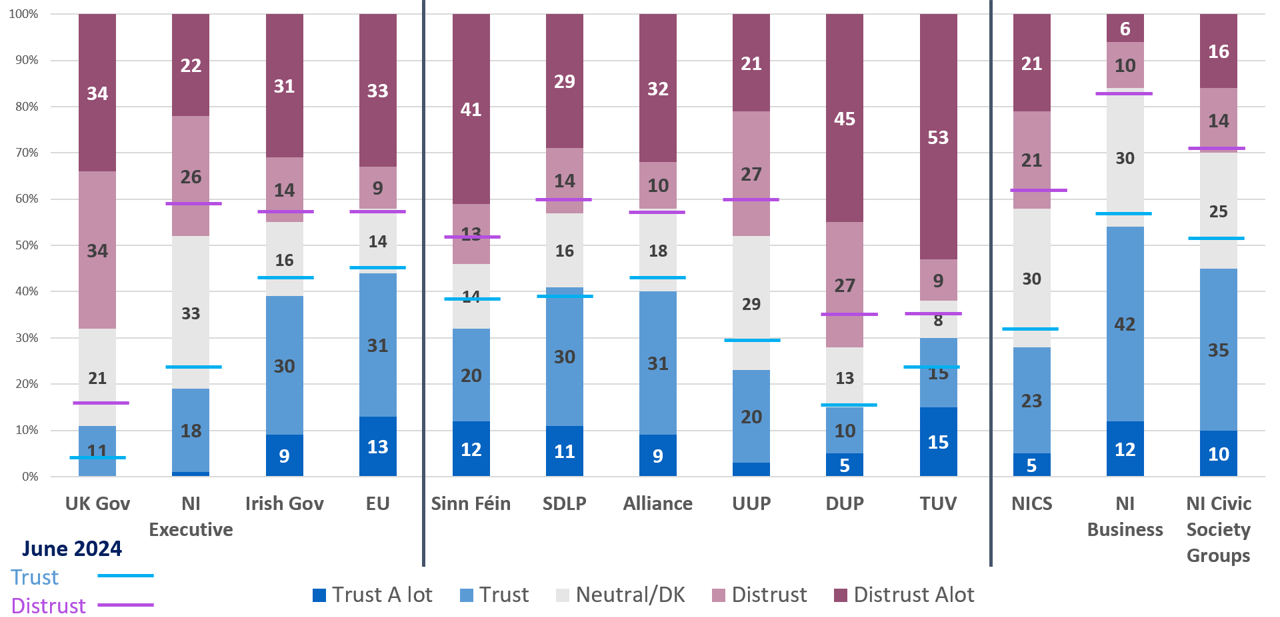
Figure 4. Levels of trust in/distrust of actors to manage the interests of Northern Ireland with respect to the Windsor Framework (%)
Broadly speaking, the picture in this poll is that levels of trust and distrust have returned to those of mid-2023, i.e. post-Windsor Framework and pre-Safeguarding the Union. Trust in the UK Government when it comes to managing the interests of Northern Ireland with respect to the Windsor Framework, having dropped to 3% in June 2024 (the same level as in February 2023) has now increased to 11%, its highest level across all polls. Distrust in the UK Government (68%) remains very high but is at its lowest recorded level. 34% of respondents distrust the UK Government ‘a lot’ – a drop from 43% in October 2024.
By contrast, trust in the European Commission/EU to manage the Windsor Framework in the interests of Northern Ireland (44%) has improved since October 2024 (41%). In June 2023, almost half of voters (49%) trusted the European Commission/EU. Distrust in the European Commission/EU remains at 42%, consistent with its position since October 2023. Trust in the Irish Government (39%) has fallen since October 2024 (43%). Distrust in the Irish Government remains steady at 45%.
Trust in the NI Executive to manage the interests of Northern Ireland with respect to the Windsor Framework (19%) has fallen again compared to February 2024 (25%) but remains higher than in October 2023 (15%). Distrust of the NI Executive stood at 49% in October 2023 but dropped to 37% in February 2024; it has since moved up to 48%, suggesting a sizeable portion of voters remain less enamoured by the new NI Executive more than a year into its work.
As in the last three polls, this latest poll inquired into levels of trust/distrust of NI civil servants. The level of trust (28%) has dropped markedly since February 2024 (40%) and to below the level of October 2023 (35%). The level of distrust (42%) remains unchanged since October 2024 and so markedly higher than in February 2024 (30%).
As for the main political parties in Northern Ireland, the level of trust in the Alliance Party (40%) has recovered slightly since October 2024 (38%) when it was at its lowest level across all polls. Its highest level was 50% in June 2022. Trust in the Social Democratic and Labour Party (SDLP) stands at 41% and so still lower than the 46% in February 2024. There has been a notable drop in trust in the Ulster Unionist Party (UUP). Having risen to 37% in February 2024, trust in the party is now down to 23% – its lowest level to date. Correspondingly, levels of distrust in the UUP have risen to 48% compared to 35% in February 2024. It has therefore lost its position as the least distrusted political party, a position now shared by Alliance (42%) and the SDLP (43%). The proportion trusting Sinn Féin has decreased since June 2024 (38%) to 32%, while distrust in Sinn Féin has seen a corresponding rise to 54% (up from 48%).
Distrust in the DUP to manage the interests of Northern Ireland with respect to the Windsor Framework (72%) has fallen back from 77% in October 2024, but remains higher than in February 2024 (67%) when its Safeguarding the Union deal with the UK Government was announced. Trust in the DUP remains stubbornly low at 15%, having previously fallen from 27% in October 2023. Respondents were also asked to consider the extent to which they trust the Traditional Unionist Voice (TUV) to manage Northern Ireland’s interests on the Windsor Framework. Distrust in the TUV, having remained the same in June 2023 and October 2023 (64%), increased to 71% in February 2024 but has once again fallen back and now stands at 62%. Trust in the TUV, having fallen to 20% in February 2024, is now at 30%. More respondents currently trust the TUV than trust either the DUP or the UUP, and fewer respondents distrust the TUV than distrust the DUP. As in October 2024, however, three quarters of ‘strong unionists’ (77%) trust the TUV compared to a little over a third (34%) trusting the DUP. ‘Slight unionists’ trust the TUV (28%) more than they trust the DUP (18%).
Managing and monitoring the Windsor Framework
Poll participants were also asked for their views on seven bodies involved in managing, monitoring and reviewing the Windsor Framework. Important to note here is that the LucidTalk Northern Ireland Opinion Panel tends to attract participants who are interested in politics and so awareness of some bodies is likely to be high. The seven bodies comprised two joint EU-UK bodies responsible for the implementation (EU-UK Joint Committee, EU-UK Specialised Committee on the implementation of the Windsor Framework), three parliamentary bodies (the House of Commons Northern Ireland Affairs Committee, the recently established House of Lords Northern Ireland Scrutiny Committee, and the NI Assembly’s Windsor Framework Democratic Scrutiny Committee), Intertrade UK (established under Safeguarding the Union), and the Independent Review of the Windsor Framework (established following the NI Assembly’s ‘democratic consent’ vote in December 2024). A first question concerned awareness of each of these bodies (see Figure 5).
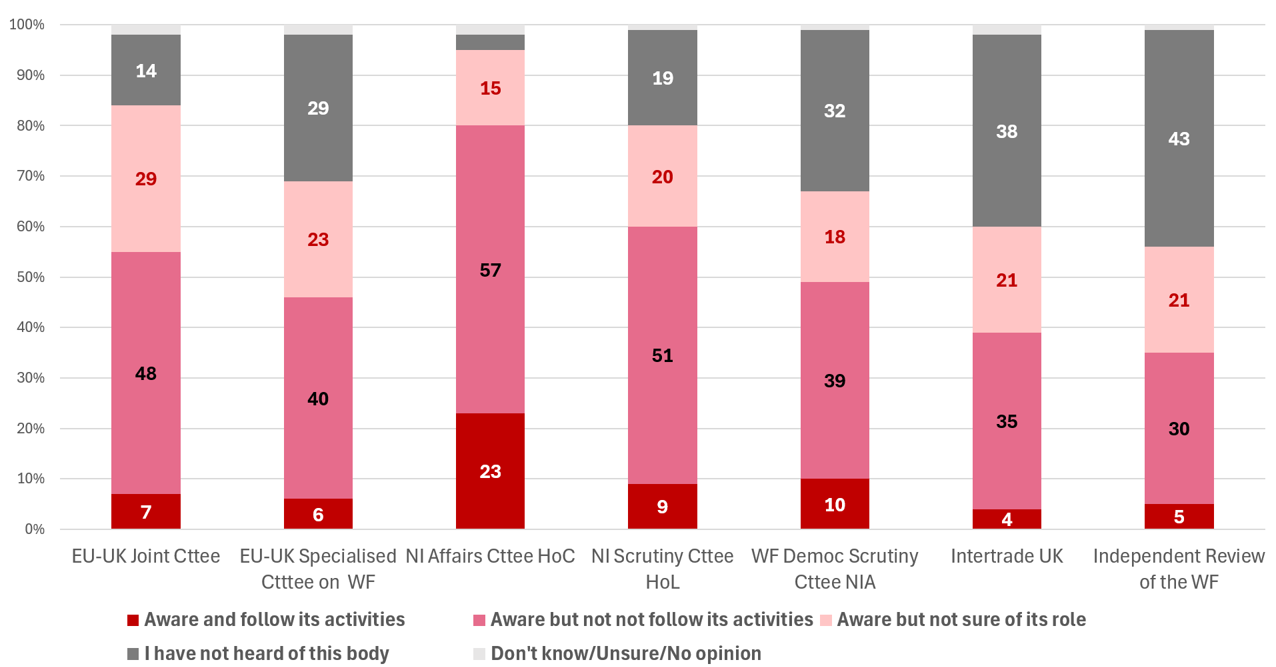
Figure 5. Awareness of bodies involved in managing the implementation of the Windsor Framework and monitoring its effects (%)
The body of which most respondents are aware is the Northern Ireland Affairs Committee in the House of Commons (95%), most likely a reflection of the fact that it is a well-established parliamentary committee focused on Northern Ireland and involves MPs from a range of NI political parties. Almost a quarter of respondents (23%) follow its work. Awareness of the Northern Ireland Scrutiny Committee (80%) is also high. However, only 9% of respondents follow its work. A similar proportion (10%) follow the work of the NI Assembly’s Windsor Framework Democratic Scrutiny Committee, with a further 57% of respondents being aware of it. A third of respondents (32%) have not heard of the committee, however. Overall, levels of awareness of the parliamentary committees are high, even if the clear majority of respondents do not follow their activities or are not sure of their roles.
Levels of awareness of the EU-UK Joint Committee (84%) and the EU-UK Specialised Committee (69%) are also high, although fewer than one in ten respondents follows their activities. A majority of respondents are aware of Intertrade UK (60%) and of the Independent Review of the Windsor Framework (56%). However around two fifths have not heard of either body.
In terms of the effectiveness of the seven bodies in addressing the impact of Brexit and/or the Windsor Framework on Northern Ireland, none is regarded as particularly effective (see Figure 6). At least a third of respondents indicate that they do not know how effective the bodies are, are unsure or have no opinion. The only exception is the Northern Ireland Affairs Committee (28%). The figures are almost half for Intertrade UK (45%) and the Independent Review of the Windsor Framework (47%), a reflection in part at last of the fact that neither has yet issued any report.
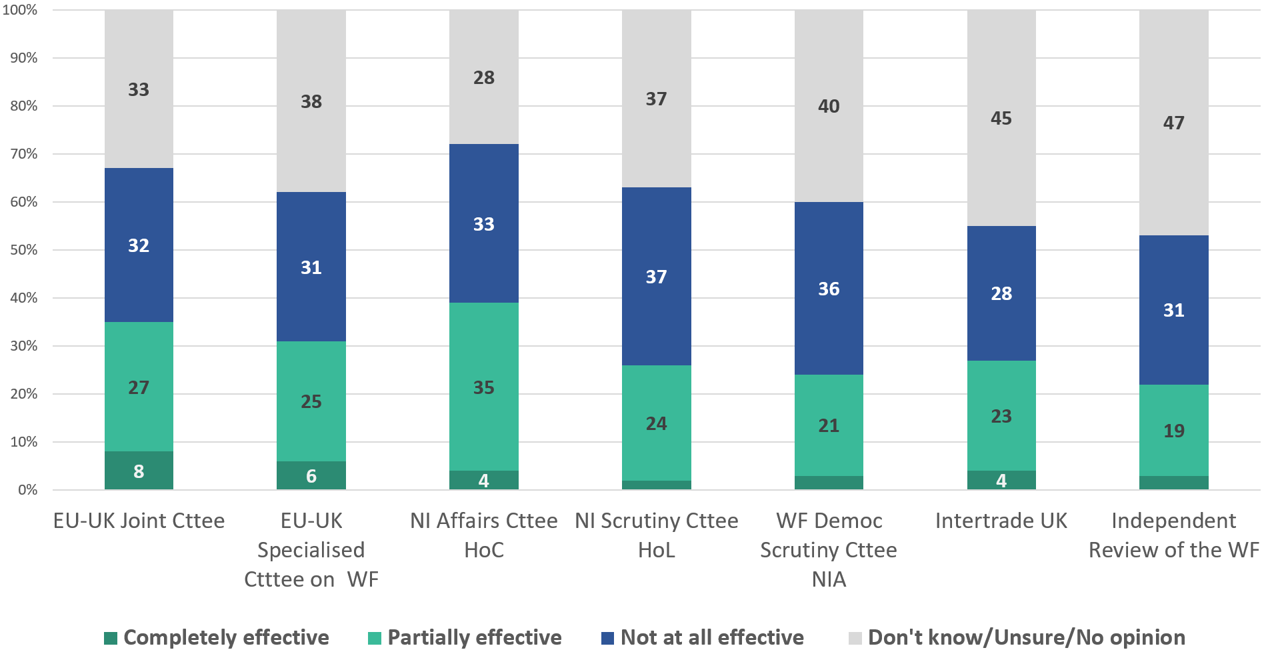
Figure 6. Effectiveness of bodies involved in managing the implementation of the Windsor Framework and monitoring its effects (%)
Of those respondents with a clear view on the effectiveness of the seven bodies, they are almost evenly split on whether the EU-UK Joint Committee and EU-UK Specialised Committee are completely/partially effective (35% and 31% respectively) or not effective at all (32% and 31% respectively). Respondents identifying as ‘nationalist’ are at least six times more likely to see the EU-UK Joint Committee as effective than not at all effective; it is the opposite with respondents identifying as ‘strongly unionist’. Respondents identifying as ‘slightly unionist’ are less radically split (completely/partially effective – 20%; not effective at all – 34%).
The body regarded as the most effective is the Northern Ireland Affairs Committee; two fifths of respondents see it as either completely effective (4%) or partially effective (35%). A third (33%) regard it, however, as not at all effective. Similar proportions also see the Northern Ireland Scrutiny Committee in the House of Lords (37%) and the NI Assembly’s Windsor Framework Democratic Scrutiny Committee (36%) as not at all effective, with around a quarter viewing the two committees as effective (for the most part ‘partially’).
A third question asked respondents to rank what matters most to them in judging the effectiveness of the seven bodies in addressing the impact of Brexit and the Windsor Framework on Northern Ireland (see Figure 7). Of the six issues that respondents were asked to rank, the majority (53%) place ‘proven ability to identify issues that matter in Northern Ireland’ in their top two priorities, closely followed by ‘proven impact in solving problems for Northern Ireland’ (48%). The third most prioritised issue is transparency regarding activities.
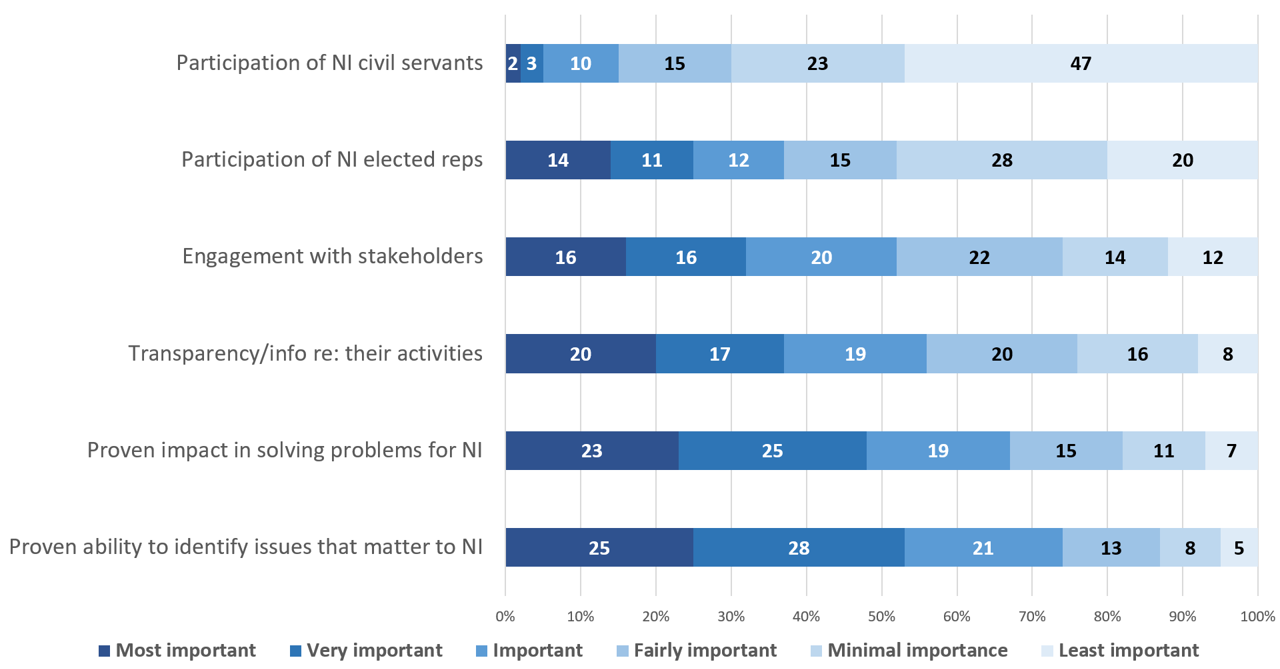
Figure 7. What matters for the effectiveness of bodies involved in managing the implementation of the Windsor Framework and monitoring its effects (%)
The three remaining issues concerned involvement of stakeholders, politicians and civil servants in the work of the bodies. Similarly to the findings on trust (see above), respondents rank the bodies’ engagement with stakeholders higher than the participation of NI political representatives (MPs or MLAs) in the work of the bodies. Generally ranked least important for the effectiveness of the bodies was the participation of civil servants.
There are interesting differences according to political affiliation in the responses to these questions on the effectiveness of such bodies. The participation of elected representatives is more important for respondents identifying as ‘strongly unionist’ than those of other affiliations; engagement with stakeholders is more important for those identifying as ‘strongly nationalist’ than others. A ‘proven ability to identify issues that matter to Northern Ireland’ is of considerably less importance to ‘strongly unionist’ and ‘strongly nationalist respondents than their ‘softer’ counterparts. Across the spectrum, there is agreement that the participation of NI civil servants is of least significance in ensuring effectiveness of such bodies.
Implementing the Windsor Framework
The final section of the poll focusing on the Windsor Framework asked respondents for their views on a range of questions concerning its implementation. An initial set of questions considered the activities of the NI Assembly (see Figure 8). The first issue was the outcome of the ‘democratic consent’ vote in December. Almost two fifths (38%) of respondents agree that unionist MLAs were right to vote against the continued application of Articles 5-10 of the Windsor Framework. This includes the overwhelming majority of DUP (94%) and TUV (92%) voters and two-thirds (67%) of UUP voters. Overall, 42% of ‘slightly unionist’ respondents agree; 23% disagree. Almost half of respondents (47%) overall also disagree. Fewer female (33%) than male (45%) respondents support unionist MLAs' vote against democratic consent This is the largest gap between males and females in the poll findings.
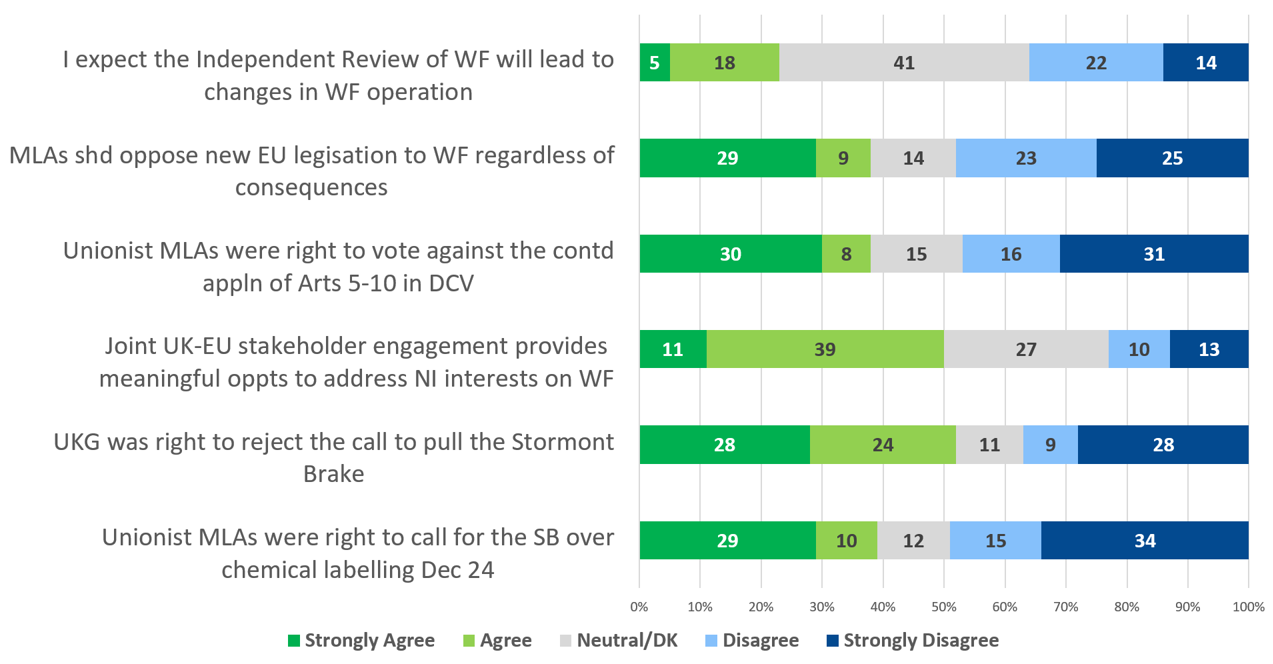
Figure 8. Implementing the Windsor Framework (%)
Respondents are similarly split over whether unionist MLAs were right to call for the pulling of the Stormont Brake in December 2024 over amendments to EU rules on the packaging and labelling of chemicals; 39% agree; 49% disagree. The overwhelming majority of DUP (94%) and TUV (93%) voters and two-thirds (68%) of UUP voters agree. Overall, 49% of ‘slightly unionist’ respondents agree; 26% disagree. Similarly, the clear majority of DUP (89%) and TUV (92%) voters and two-thirds (66%) of UUP voters disagree that the UK Government was right to reject the call of unionist MLAs to pull the Stormont Brake. The majority of respondents (52%) agree, however, with the UK Government’s rejection; a quarter (26%) disagree. Unsurprisingly, there are significant differences between party supporters on this question, with 91% and 87% of Sinn Féin and SDLP supporters respectively agreeing with the Government’s decision (compared to 4% of DUP supporters and 35% of UUP supporters). Fewer female (32%) than male (45%) respondents support the attempt to pull the Stormont Brake. More females (55%) than males (49%) support the UK Government's decision not to pull the Stormont Brake.
On whether MLAs should oppose the addition of any new EU acts to the Windsor Framework ‘regardless of the political or practical consequences’, fewer respondents agree (38%) than disagree (48%). The figures are in line with when the question was asked in June 2024 (36% agree, 49% disagree). Fewer females (34%) than males (42%) wish to see MLAs oppose new EU acts regardless of the consequences.
In other questions, half (50%) of respondents agree that Joint EU-UK engagement with NI stakeholders provides meaningful opportunities for NI interests to be addressed; almost a quarter (23%) disagree, primarily respondents identifying as ‘strongly unionist’ (58%). Only a quarter (25%) of respondents expect that the Independent Review of the Windsor Framework commissioned by the UK Government will lead to changes in how the Windsor Framework operates; more than a third (36%) disagree. Most are either neutral on the question or ‘don’t know’ (41%).
In terms of the operation of the Windsor Framework, 36% of respondents are bothered by ‘Not for EU’ labelling on supermarket shelves and products (see Figure 9). This is an increase on previous polls when the question was posed (29% in June 2024, 24% in February 2024, 25% in October 2023). More respondents (41%) disagree, yet that figure is lower than in previous polls (49% in June 2024, 50% in February 2024, 51% in October 2023).
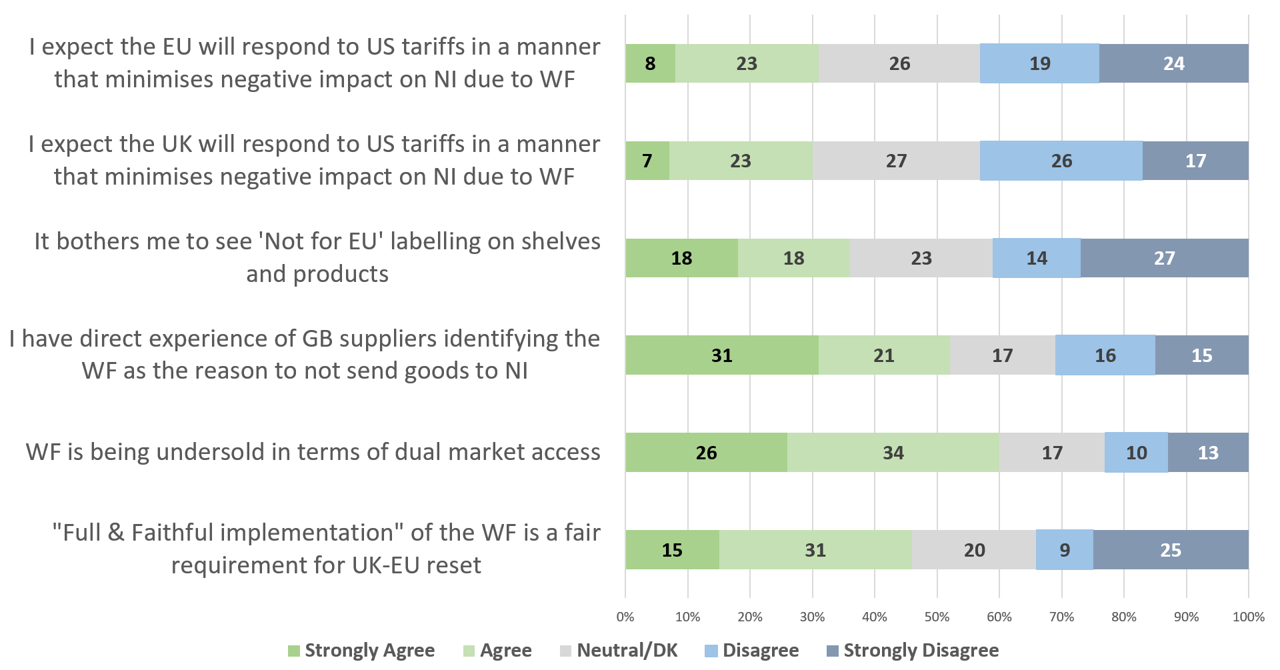
Figure 9. Tariffs and trade under the Windsor Framework (%)
A majority (52%) has ‘direct experience of GB suppliers identifying the Windsor Framework as the reason for not sending goods’ to them in Northern Ireland. However, whereas majorities of respondents identifying as ‘strongly unionist’ (85%) and ‘slightly unionist’ (56%) have such direct experiences, the same is the case with only a minority of respondents identifying as ‘neutral’ (42%) ‘slightly nationalist’ (38%) and ‘strongly nationalist’ (18%). A clear majority (60%) of respondents are of the view that the Windsor Framework is being ‘undersold in terms of the dual market access opportunities’ it provides for NI producers. Whereas a majority of respondents identifying as ‘slightly unionist’ (60%) ‘neutral’ (77%) ‘slightly nationalist’ (82%) and ‘strongly nationalist’ (87%) agree with this view; the majority of respondents identifying as ‘strongly unionist’ (57%) disagree.
On whether the UK and EU will respond to US tariffs in a manner that minimises any negative impact on Northern Ireland as a consequence of the Windsor Framework, respondents disagree (UK – 43%; EU – 43%) more than they agree (UK – 30%; EU – 31%). Those who disagree tend more to ‘disagree slightly’ (26%) with regard to the UK and to ‘disagree strongly’ (24%) with regard to the EU. For both the UK and the EU, the majority of respondents identifying as ‘strongly unionist’ (53% and 78% respectively) and ‘slightly unionist’ (52% and 60% respectively) disagree that they will respond in a manner that minimises any negative impact. Other respondents are less pessimistic.
The Future of the UK-EU Relationship
The final section of the poll focused on the wider UK-EU relationship and whether respondents wish to see closer relations and, if so, what areas for cooperation should be prioritised. The clear majority (66%) of respondents generally approve of the current UK Government’s policy of pursuing closer relations with the EU. Support is particularly high among Sinn Féin (98%), SDLP (98%) and Alliance (97%) voters. A majority of UUP voters (57%) are also supportive. Most respondents identifying as ‘strongly unionist’ (74%) oppose the pursuit of closer UK-EU relations. This is reflected in levels of opposition among DUP (71%) and TUV (89%) voters. More females (70%) than males (61%) generally support the Government’s policy; respondents aged 55-64 are least supportive (57%). A related question asked earlier in the poll was whether the ‘full and faithful’ implementation of the Windsor Framework is a fair requirement for a reset in UK-EU relations. Almost half (46%) of respondents agree, including (72%) of non-unionist respondents; a third (34%) disagree. Those disagreeing included 84% of respondents identifying as ‘strongly unionist’ and 36% of respondents identifying as ‘slightly unionist’.
For most of the 66% of respondents who support closer UK-EU relations, the priority areas for cooperation concern removing barriers to trade between the UK and the EU (see Figure 10). The most highly ranked of ten priorities, are ‘increasing trade in goods’ and ‘measures to reduce formalities, checks and controls on the movement of goods between GB and Northern Ireland’. A majority of respondents rank these among their top four priorities. For most respondents, the next set of priorities are an agreement on agrifood movements (e.g. a so-called ‘SPS’ agreement), an agreement to enable more UK-EU mobility for young people, reducing restrictions on the movement of workers between the EU and the UK, and increasing trade in services. Tackling illegal migration is the lowest ranked priority; almost half of respondents (45%) supporting closer relations ranked it lowest. A clear majority of DUP and TUV voters supporting closer UK-EU relations rank tackling illegal migration in their top four priorities.
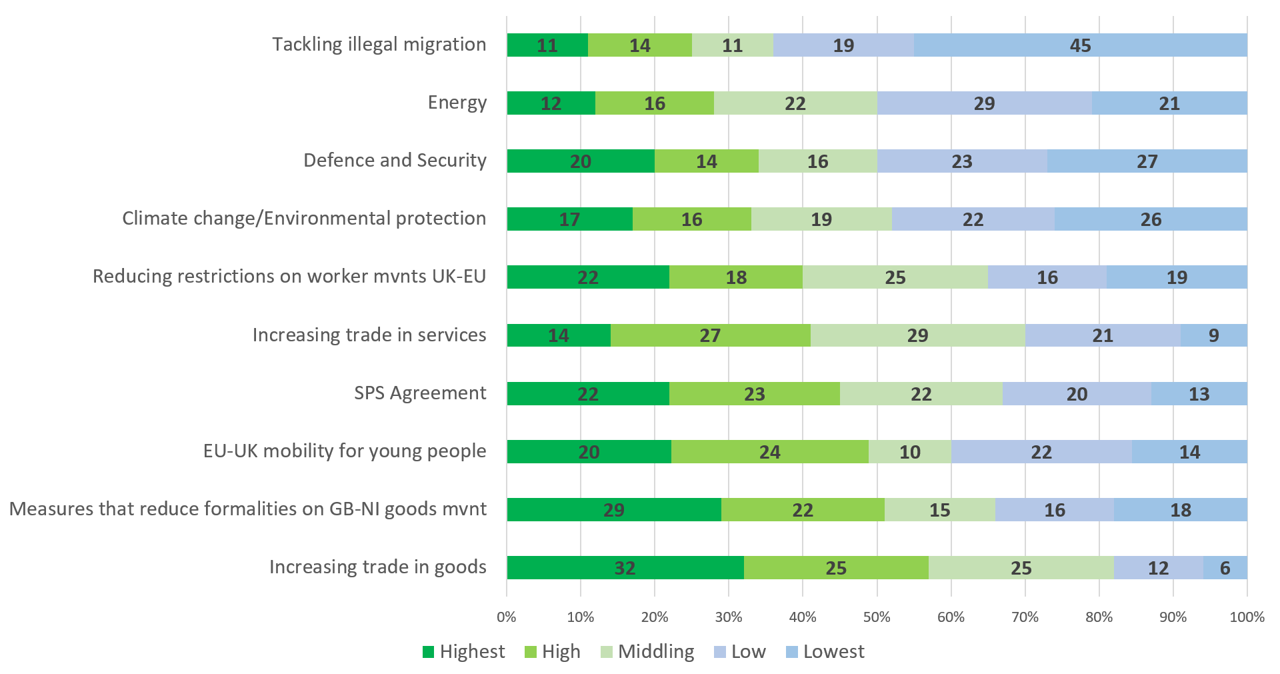
Figure 10. Priorities for closer UK-EU cooperation – Views of respondents in favour of closer cooperation (%)
Written comments
We allow space at the end of the poll for respondents to leave any comments that they wish. While some respondents take the chance to comment on the questions and design of the poll, most of the 282 comments express opinions on the topic of Brexit/Windsor Framework, or related matters. They are a rich resource for giving more colour to some of the trends that are reflected in the quantitative data. Because the comments are not from the weighted sample, we cannot describe them as representative, but they do give an indication of some of the sentiments and opinions behind the figures. All the comments quoted here are verbatim.
There are, as with all previous polls, comments expressing negative views about Brexit which is described as ‘a disaster’, ‘a mistake’. Comments often focus on the negative effects for Northern Ireland and the wider UK.
“It was a disaster for N Ireland for the UK to leave the EU. The whole thing was ill advised and not property thought through.” (19)
“Brexit has been a disaster for the economy and robs young people the chance to experience work in other countries. Brexit has destabilised NI.” (45)
“Brexit is a disaster. It has no positives and the UK has suffered massive economic consequences because of it.” (190)
“Brexit was a mistake, and was based on lies and false information.” (256)
There continue to be comments maintaining that Brexit was not fully delivered for Northern Ireland.
“Bring on Brexit Scrap the Windsor Framework.” (82)
“Northern Ireland didn't get the Brexit that was voted for in the nationwide poll. The Windsor Framework will do nothing to assist Northern Ireland to remain within the UK, on the contrary it is designed to facilitate it's removal.” (100)
“Brexit should mean Brexit. A total break from all EU laws and courts. A UK for the UK.” (104)
There are various criticisms of the political handling of Brexit and the Windsor Framework, with politicians being accused of incompetence.
“I believe BREXIT and the fallout from it is single handedly leading the way towards a future United Irish economy within the EU and has been handled awfully by the UK & NI governments.” (55)
“The entire thing is a mess caused by Brexit and exacerbated by the corruption and incompetence of the UK government. The NI Executive is useless as well. All of it is just rearranging deck chairs on the Titanic.” (225)
“NI has been betrayed by the UK gov on Brexit.” (270)
Just as there are strong criticisms of Brexit, so there are strong criticisms of the Windsor Framework. The Windsor Framework is criticised for various reasons, particularly its significance for the supply of goods into Northern Ireland from Great Britain.
“The protocol/ Windsor framework in all its aspects is the worst thing to be done to Northern Ireland. Brecht was never delivered to Northern Ireland. It needs to be removed completely.” (11)
“Many companies will no longer send things to NI affecting me. I've also experienced problems with getting certain medication, I feel punished by the EU not helped.” (59)
“The Windsor Framework needs to be done away with . Every day i experience the negative impact of it . The additional cost of the Windsor Framework make life inn Northern Ireland intolerable and the people extremely angry.” (99)
“I like many others have less consumer choice now as many suppliers I used in the past won't supply NI. I get it that it was a fast track loophole to make brexit UK able to work with the EU. But it was a rubbish deal. Perhaps in the future the UK will re allign legally with the EU in the way that PM May suggested.” (123)
“More and more suppliers are not delivering to N.Ireland . No one sends to be addressing the reasons. We are being treated as 2nd class consumers.” (150)
There are few comments specifically referencing an ‘Irish Sea border’; more argue for the border to be between Northern Ireland and the Republic.
“the boarder in the Irish sea should be removed if the EU want to protect themselves put the border back where it belongs between 2 different countries who even have different currency money as we are 2 different states.” (25)
“We hate the 'Windsor Framework', putting a border between us and the rest of our own country, the UK. We don't want either it, nor to be still stuck on the EU even though the outcome of the nationwide referendum (including Northern Ireland), was OUT of the EU!!!” (95)
“Brexit means brexit, the UK voted to leave as a nation. We didn't vote to keep one foot in the grave. Get NI out of Europe and close the irish border.” (125)
“We did not get Brexit! Put the border back to where it belongs!” (245)
Other respondents are more interested in their being a border poll.
“Border poll date required, discussions and planning properly recognised and facilitated. NI is nothing but a constitutional nuisance for everybody involved. Old unionist romantic notions and ideas are not reason enough to keep this failed statelet going. Nobody wins if NI remains.” (24)
“Frankly I'm tired of the UK having any role in Northern Ireland. There should be a border poll now.” (122)
There are relatively few positive views on the Windsor Framework. These tend to be less impassioned, viewing it as a necessary consequence of Brexit and one that could benefit Northern Ireland.
“The Windsor Framework is a necessary consequence of Brexit. Ultimately NI is a special case. They should be selling the unique dual aspect more.” (111)
“The Windsor Framework is hardly perfect but at least attempts to manage the 'intended' impact of Brexit on Northern Ireland.” (143)
“Brexit was the issue, the Windsor framework is not perfect but tries to make good on a bad thing for NI.” (231)
“The Windsor Framework is not what anyone would have wished for, ahead of the vote, but remains necessary to mitigate the huge economic damage done by Brexit. The ability to trade with both the UK and the EU gives Northern Ireland an opportunity to escape the worst disadvantages which Brexit gives to the rest of the UK.” (268)
Compared to comments in previous polls, there are few comments concerning the Irish Government or the EU. Comments on the new Labour Government are mixed.
“I voted for Brexit but we didn't get the Brexit we voted for, its turned into one big political mess and the current Labour Government are making it worse, if I had the chance to re join the EU and put things back the way they were then I would.” (159)
“Now hope labour party can move towards greater working relationships with EU, for the benefit of everyone.” (202)
“Many companies will no longer send things to NI affecting me. I've also experienced problems with getting certain medication, I feel punished by the EU not helped.” (59)
“The restrictions applied by the EU are vindictive, petty , bureaucratic and totally unnecessary.” (196)
“An English dominated UK will never look after the interests of Northern Ireland therefore I don't trust them to protect the Windsor framework.” (217)
“The Irish Government can not be trusted in terms of the rights equality and best interests of the Protestant, Unionist people.” (227)
There are very few comments on political parties. This is notably so regarding the DUP compared to recent polls, and comments regarding the DUP are notably less hostile.
“DUP were blackmailed back into Stormont and sold a pup.” (3)
“The dup told a bundle of lies to the population of Northern Ireland.” (121)
Various comments express frustration with the UK Government decision not to activate the Stormont Brake.
“Northern Ireland MLAs should have greater powers, thereby reducing the Secretary of State's role in deciding whether to accept or reject new EU regulations. The final decision should be made through a vote by the MLAs in Stormont rather than being dictated by the Secretary of State. Elected representatives in Northern Ireland must have the final say.” (74)
“The proposed’brake has been seen to be a lie as a safeguard to maintain N.I. Position in UK.” (181)
“The Windsor Frame Work, is not worth the paper it is write on. The brake has been pulled and the UK Government have rode rough shot over it. What's the point in it if they don't listen and take heed. It needs cross community agreements, but that's not happening and the Government know it.” (247)
On the future, views are mixed on closer relations.
“Honestly I'm sick of hearing about the Windsor framework, we should just rejoin the EU” (31)
“Brevity is done. UK is better out of the EU; however, close ties with Europe is good. Both sides should 'get over it'.” (34)
“The UK needs to have closer ties with EU. I would hope being member of Customs Union at very least, as it is our biggest trading partner & closest neighbour.” (256)
“Any EU - UK relations must not bring closer relations to Northern Ireland I voted to leave not to back track but final closure.” (275)
“I disagree withe the government pursuing a closer relationship with the EU because it is an unbalanced relationship & the EU has not behaved in a manner that demonstrates they value or respect us.” (281)
* * * * *
This report is available to download here:
